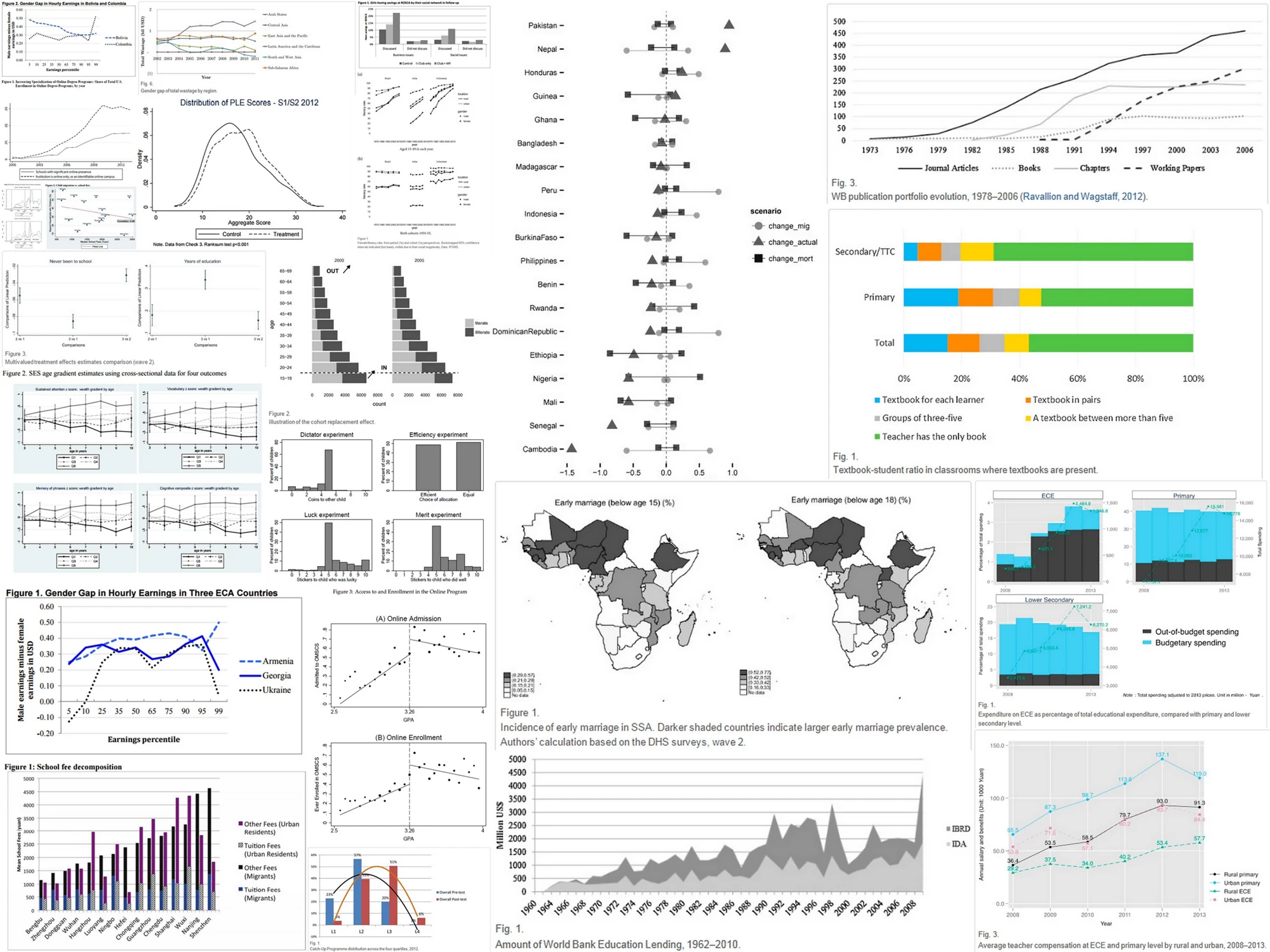Here is a curated round-up of recent research on education in low- and middle-income countries, with a few findings from high-income countries that I found relevant. All are from the last few months, since my last round-up.
If I’m missing recent articles that you’ve found useful, please add them in the comments!
Early childhood
- Pre-school or parent training? “Attending preschool makes children more egalitarian in their fairness view and the parenting program enhances the importance children place on efficiency relative to fairness” (Cappelen et al.). #USA #RCT
- “Wealth gradients [for child development outcomes] are significant at ages 3–4, widen with age, and flatten out by ages 9–10…. These gaps in cognitive outcomes translate into equally sizeable gaps in learning outcomes” (Galasso et al.) #Madagascar #LongitudinalCohort
- Organizing play groups for kids age 0-5 increased early grade reading by about 0.2 standard deviations, while an early grade reading instruction intervention increased reading by about 0.3 SDs. But – in a shocking twist! – the play-groups were cheaper so cost-effectiveness favors them (Macdonald et al.). #Tonga #RCT
- What to give parents: Information on best practice in child care or that + cash? Both improved maternal knowledge and behavior. Cash moved some actual outcomes, but only for older siblings (Levere et al.). #Nepal #RCT
- Children with early child education exposure do better in language and math in primary school, almost a year’s worth of learning better. Cost-effectiveness analysis favors playgroups over kindergartens (Nakajima et al.). #Indonesia #EnrollmentHistories
- Improving the quality of community-based childcare centers plus providing group-based parenting support had short-term child development impacts, but these had dissipated 18 months later (Ozler et al.) #Malawi #RCT
- China has undergone a big expansion in early child education in recent years, but public support represents “less than 30% of the total investment,” with much of the rest coming from fees. ECE teachers receive much less than primary teachers, and rural ECD teachers are paid 40-50% less than their urban peers (Zhou et al.).
- Sending parents text messages about absenteeism and grades improved a range of academic outcomes (Berlinski et al.). #Chile #RCT
- Technology-aided after-school instruction – which dynamically adapts to student learning levels – has big impacts on math and language scores, especially for weaker students (Muralidharan et al.). #India #RCT [My post]
- Honduras replaced print textbooks with ebooks on laptops. No change in learning, but marginal cost of ebooks is low, so laptops are more cost effective with 5 or more books (Bando et al.). #RCT
- An online master’s degree in computer science increases enrollment, rather than substituting for in-person degrees (Goodman et al.). #USA #RegressionDiscontinuity
- Oh wait, in less competitive markets, the introduction of online postsecondary education did lead to substitution away from in-person degrees, particularly for “private non-selective institutions” (the list you don’t want your school to be one). Also led to increases in per-student instructional spending in public schools (Deming et al.). #USA
- Secondary school scholarships led to more secondary school completion (phew!) and also higher earnings (Duflo et al.). #Ghana #RCT
- Higher school fees “deter migrant workers from bringing their children, especially their daughters” (Dang et al.). #China #IV
- Eliminating primary school fees across Africa reduced gender and wealth differentials in attendance but maybe not in primary school completion (Langsten).
- Remedial education: Third graders in the bottom half of their science classes were assigned to 16 remedial sessions of 90 minutes each. They attended 4-5 in fact. Science test scores rose 0.12 standard deviations, driven by boys. No spillovers across subjects or students (Saavedra et al.). #Peru #RCT
- Catch-up: A reading catch-up program for 4-6 graders had “no substantial or educationally meaningful programme impact” (Fleisch et al.) #SouthAfrica #RCT
- Monitoring attendance: Full-time mentors assigned to track student attendance and follow up with students increased student attendance (Guryan et al.). #USA #RCT
Impact of education on other stuff and impact of other stuff on education
- Fertility: “We find that education ‘compresses’ the fertility distribution – women are more likely to have at least one child, but less likely to have multiple children” (DeCicca & Krashinsky). #Canada
- “Solar lanterns increased the children’s home-study hours, particularly at night and before exams…. The increased study hours and initial improvement in school attendance did not translate into improved academic performance” (Kudo et al.). #Bangladesh #RCT
- Cash: Two years after a cash transfer program ended, recipients of unconditional transfers saw few gains from themselves, but their kids were taller. Recipients of conditional transfers saw reduced fertility (Baird et al.). #Malawi #RCT [Berk’s post]
Adults
- Households were assigned to adult literacy classes for mothers, training on how to improve children’s home education, or both. All increased children’s math scores modestly (Banerji et al.). #India #RCT
- The Adult Literacy Rate captures both adults who have learned to read and new adults (i.e., as a better educated younger generation becomes adults). “In most countries, observed gains in overall adult literacy greatly overstate the degree to which adults have gained literacy at adult ages” (Barakat).
- Data from urban adults in 8 low- or middle-income countries show that “measures of reading proficiency and complexity of on-the-job computer tasks” pay off in the labor market. “Personality and behavior measures” show smaller effects (Valerio et al.).
- One size does not fit all: A program that aims to empower adolescent girls economically and socially was “highly successful in Uganda in terms of economic, health, and social outcomes.” In Tanzania, the same program "did not have any notable effect on most of these outcomes.” Adding microfinance services helped with take-up and savings (Buehren et al.) #Tanzania #RCT
- “Years of completed education explain the bulk of the gender gap in wages.” But “cognitive and noncognitive skills affect men’s and women’s earnings in different ways,” drawing on data from urban adults in 7 countries (Tognatta et al.).
- Girls consistently perform better than boys in language, math, social competence, and emotional maturity tests between the ages of 6 and 9 (Nakajima et al.). #Indonesia
- Intergenerational educational mobility has risen over time – say data from 9 Sub-Saharan African countries – but parental education still matters a lot, especially in Comoros and Madagascar, less so in Ghana, Guinea, Nigeria, and Uganda (Azomahou & Yitbarek). #Africa
- Early marriage widens the education gender gap in the next generation, using data from 25+ countries (Delprato et al.). #Africa
- “Globally, 8.1% of total public expenditure for primary education was wasted in 2011” due to “internal inefficiency” (through dropout and repetition). That's 32.6 billion USD (Mizunoya & Zaw).
- Providing public financing to private schools increases outcomes relative to unsubsidized private schools. Why? Probably partly through better inputs and partly through student selection (Barrera-Osorio et al.). #Uganda #RCT
- Teachers: Across 7 Sub-Saharan African countries, “students receive two hours and fifty minutes of teaching per day…. Large shares of teachers do not master the curricula of the students they are teaching; basic pedagogical knowledge is low; and the use of good teaching practices is rare.” They find “significant and large positive effects of teacher content and pedagogical knowledge on student achievement” (Bold et al.). #Africa
- Special education: “Though Ghana has not yet been able to place all children with disabilities into mainstream schools, the few who have been placed face a lot of challenges. It was revealed by the school children with disabilities that, they are discriminated against by their colleagues, teachers, and the society as a whole” (Mantey). #Ghana #Qualitative – Lots of direct quotes
- The World Bank and Education: Over the last 50 years, the proportion of World Bank projects with education components has increased dramatically. Over the last 25, so have World Bank publications in education (Zapp).
- Data: “We introduce a new set of estimates on educational attainment and inequality measures of education for 142 countries over the period 1970–2010” (Jordá & Alonso). [Data set]
- Inputs: In many Rwandan classrooms, the only textbook is in the hands of the teacher. When relatively few learners have books, teachers just use them to prepare their lessons. Oh, and teachers complain that the books are out-of-date, have errors, and are too advanced (Milligan et al.). #Rwanda #MixedMethods
- Political economy: “A large school construction program in Indonesia… led to important increases in the provision of public goods…. The increase in the education of the village heads [may have been] one of the main mechanisms behind these results” (Martinez-Bravo) #Indonesia #DiffInDiff
- Patience: Education increases patience! Youth who attended college (due to a lottery) were more patient (Perez-Arce). #Mexico #RCT
- Higher education: “Is there variation in instructor effectiveness in higher education?” Yes, in both current and future courses. “Does effectiveness correlate with teaching experience and salary?” Yes, with course teaching experience; not with salary. “Minimal correlation between [student end-of-course] evaluation scores and our measures of effectiveness” (De Vlieger et al.) #USA #ValueAdded



Join the Conversation